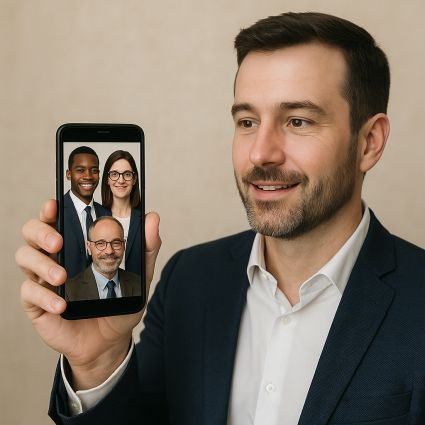“Like having a team of PhD level experts in your pocket,” is attributed to OpenAI CEO Sam Altman. The problem is, just because we have access to this level of knowledge doesn’t mean we know how to use it. It doesn’t mean we know how to test it for reasonability or possible hallucinations.
This is nothing new. How many GTM professionals read Harvard Business Review, think about the content, and adapt it to what they are trying to do? How many professionals regularly consult sources like Google Scholar, the Library of Congress, ProQuest, ResearchGate, and others? All of these resources provide PhD level knowledge and have been available for decades.
When we do get access to this level of knowledge and research, do we know what it means and how to use it? Can we translate it to something that is meaningful and impactful to others? Can we use it to help us perform better in our jobs?
I’m embarrassed to say, my good friend, Curtis Schroeder, recently shared his PhD dissertation, “Thinking Like a C-Suite Strategist: The Impact of Salesperson Executive Officer Mentality on B2B Buying Team Complexity and Salesperson Performance.” You’d think it would be something I would devour. The executive summary was fantastic. I started reading the dissertation, but got lost in the data analysis. While I got a lot out of it, I didn’t get as much as I should have, simply because I didn’t have the ability to understand what Curtis was talking about.
Access to deep knowledge has never been a problem–at least since Google Search has existed. The issue is, are we accessing it? And when we do, do we know how to use it? Do we know how to leverage it in ways that are impactful with the people we work with, internally and with customers?
The reality is, the exact opposite has been happening. We don’t understand our customers and their businesses. We barely understand our products. We can follow scripts, but when the customer goes off script, we don’t know how to get them back on script. We can handle objections, only if they are the objections on our lists, with the appropriate response.
And then the ultimate challenge, we capture a customer’s interest and they respond, “Tell me more…..”
Leveraging PhD knowledge is only helpful if we know what it means. If we know what it might mean to our customers and the people we work with. If we can translate it into something that is critical to them helping them more effectively achieve their goals. If it actually improves our own performance.
Access to PhD knowledge is only useful if:
- We can interpret it correctly–and challenge it if it doesn’t make sense.
- Translate it into something meaningful and impactful in our customers’ and our worlds.
- Link it to the challenges we all face and how we better achieve our goals.
- Use it to raise the performance of our customers, our teams, and our own performance.
Mastery doesn’t come from instant access or being given the answers. It comes from hours, months, and years of deliberate practice. While Malcolm Gladwell’s 10,000 hour rule may not be a precise formula, the principle applies. We can’t download or copy mastery from a LLM. We build it, constantly, everyday.
“Demonstrating profound knowledge builds immediate credibility. The right audience recognizes real depth instantly.” (From Work In Progress by Thomas Otter)
What do you do to move forward, some thoughts:
- Constantly build your business and customer acumen: Understand your and your customers’ industries, business models, financial drivers, competition, market trends. Learn how to speak about the issues critical to the priorities, focusing on what they mean and potential outcomes.
- Master your craft: Move beyond activity metrics, playbooks, and scripts. Master the entire selling process. Be able to handle unscripted conversations, rather engaging customers in collaborative, value based conversations.
- As leaders (regardless whether you are in a leadership role): Develop deep knowledge of your people, your organization, the people/customers/market you serve. Develop the ability to influence without authority, guiding people to better decisions and outcomes. Lead by example. Build trust, through competence, reliability, genuine interest/caring.
- Be obsessive in your learning, relentless in execution. Constantly be experimenting, testing, learning in everything you do. Apply these ideas relentlessly, using the outcomes to refine your learning, cycling through again.
Afterword: Here is a great AI generated discussion of the article. Enjoy!

Leave a Reply